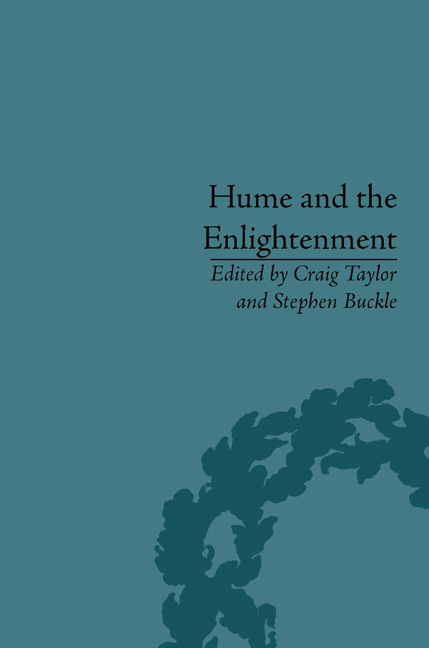Book contents
- Frontmatter
- CONTENTS
- Acknowledgements
- List of Contributors
- Abbreviations
- Introduction: Hume and his Intellectual Legacy
- 1 Hume and the Enlightenment
- 2 Will the Real Enlightenment Historian Please Stand Up? Catharine Macaulay versus David Hume
- 3 Philosophy, Historiography and the Enlightenment: A Response to Green
- 4 Hume's Enlightenment Aesthetics and Philosophy of Mathematics
- 5 Part 9 of Hume's Dialogues and ‘The Accurate Philosophical Turn of Cleanthes
- 6 ‘Strange Lengths’: Hume and Satire in the Dialogues Concerning Natural Religion
- 7 A Modern Malignant Demon? Hume's Scepticism with regard to Reason (Partly) Vindicated
- 8 Hume on Sympathy and Cruelty
- 9 Hume's Natural History of Justice
- 10 Hume and Rawls on the Stability of a Society's System of Justice
- 11 Can Hume's Impressions of Reflection Represent?
- 12 Mechanism and Thought Formation: Hume's Emancipatory Scepticism
- Notes
- Works Cited
- Index
3 - Philosophy, Historiography and the Enlightenment: A Response to Green
- Frontmatter
- CONTENTS
- Acknowledgements
- List of Contributors
- Abbreviations
- Introduction: Hume and his Intellectual Legacy
- 1 Hume and the Enlightenment
- 2 Will the Real Enlightenment Historian Please Stand Up? Catharine Macaulay versus David Hume
- 3 Philosophy, Historiography and the Enlightenment: A Response to Green
- 4 Hume's Enlightenment Aesthetics and Philosophy of Mathematics
- 5 Part 9 of Hume's Dialogues and ‘The Accurate Philosophical Turn of Cleanthes
- 6 ‘Strange Lengths’: Hume and Satire in the Dialogues Concerning Natural Religion
- 7 A Modern Malignant Demon? Hume's Scepticism with regard to Reason (Partly) Vindicated
- 8 Hume on Sympathy and Cruelty
- 9 Hume's Natural History of Justice
- 10 Hume and Rawls on the Stability of a Society's System of Justice
- 11 Can Hume's Impressions of Reflection Represent?
- 12 Mechanism and Thought Formation: Hume's Emancipatory Scepticism
- Notes
- Works Cited
- Index
Summary
In ‘Will the Real Enlightenment Historian Please Stand up? Catharine Macaulay versus David Hume’, Karen Green takes exception to my account of Hume as an Enlightenment thinker. She argues that Hume is not an Enlightenment thinker, because he does not argue for the rights that underpin modern democracy; that this failure is inevitable, given his basic principles, because empiricism is an inadequate foundation for Enlightenment principles; and that it is Catharine Macaulay, and not Hume, who should be classed as the genuine historian of the Enlightenment. I will consider each of these three theses, and offer a concluding moral.
The Enlightenment, Democratic Rights – and ‘Whig History’
The Enlightenment, says Green, ‘consisted fundamentally in the establishment of the development of the idea that individuals have political rights, which underpins the growth, during the nineteenth century, of democratic forms of government’. On this basis, she concludes, ‘Hume is not a philosopher of the Enlightenment’. There is no doubt that the inference is sound. If that is what the Enlightenment was, then Hume did not belong to it. But is this tight focus on political rights the most convincing approach to understanding the Enlightenment? It should already be clear, from ‘Hume and the Enlightenment’, that I think it is not: it ignores the more moderate strands of Enlightenment thought, giving priority to the radicalism of the late Enlightenment in France.
- Type
- Chapter
- Information
- Hume and the Enlightenment , pp. 53 - 64Publisher: Pickering & ChattoFirst published in: 2014

